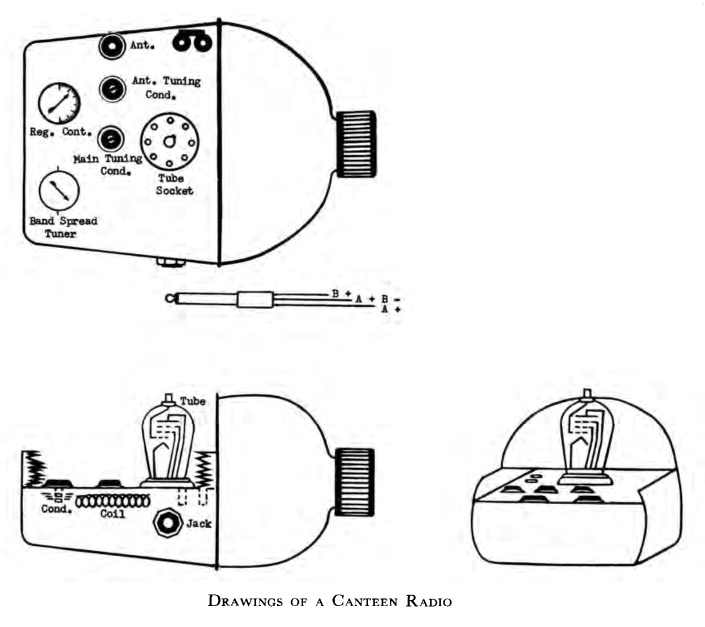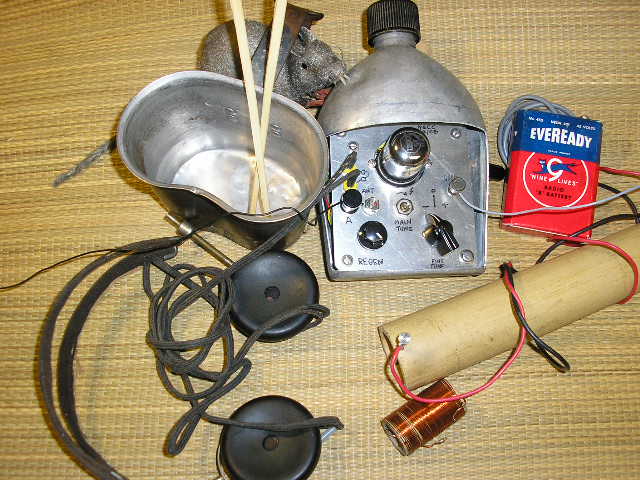Author Archive
 Ten Year Trends in US Ham Licenses
Ten Year Trends in US Ham Licenses
In November 2005, I took a look at some statistics on FCC amateur radio licenses. At that time, I compared the number of ham licenses to such things as the US population, number of cell phones in use and the number of birdwatchers in the US. Interesting stuff.
Ten years later, we can take a look at the how the composition of FCC licenses has changed. The total number of licenses has grown to over 733k, increasing 11% over 10 years. This is a small growth rate, only 1% Compound Annual Growth Rate (CAGR).
| Extra | Advanced | General | Technician | Novice | Total | |
| Nov 2005 | 107,177 | 74,351 | 135,023 | 317,839 | 26,882 | 661,272 |
| 16% | 11% | 20% | 48% | 4% | 100% | |
| Nov 2015 | 139,515 | 48,272 | 172,239 | 362,580 | 10,988 | 733,594 |
| 19% | 7% | 23% | 49% | 1% | 100% | |
| % Change | 30% | -35% | 28% | 14% | -59% | 11% |
Source: www.ah0a.org
No surprise that the number of Advanced and Novice licenses has decreased because the FCC stopped issuing those licenses. Technicians represent about half of the licenses, a proportion that has remained steady over the decade, increasing 1 point. The percent of Generals increased by 3 points, to 23%. Similarly, Extra Class licenses increased by 3 points to 19%.
I reported the ARRL membership as approximately 152k in 2005. The 2014 ARRL Annual Report shows 165,663 members resulting in a growth rate of about 9% over 9 years (not ten). I’ll go ahead and “spot them” another point of growth in the tenth year and call it 10% over ten years. So it seems that ARRL membership is roughly keeping pace with the growth in amateur radio licenses, put probably not gaining on it.
Another question is how are amateur radio licenses keeping pace with US population growth? During the period of 2005 to 2015, the US population grew about 9%, which means that the number of FCC licenses is actually growing slightly faster than the overall population. Source: http://www.worldometers.info/world-population/us-population/
At this point, many of us will ask how many of those FCC license holders are actually active in ham radio. Hard to say…perhaps a topic for another post.
73, Bob K0NR
The post Ten Year Trends in US Ham Licenses appeared first on The KØNR Radio Site.
 Sorry, I’ve Been On 2m FM Again
Sorry, I’ve Been On 2m FM Again
This recycled post from 2008 is still accurate, but I do have my HF antenna up and recently used it for the CQ WW SSB Contest.
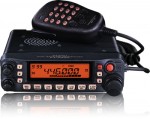 I was looking out the window the other day and noticed that my wire HF antenna is laying on the ground. Hmmm, probably doesn’t radiate very well that way. But if I put a long, lossy coaxial cable in line, the SWR will still be good at the transmitter. And I can tell my buddies that it works just fine because “I can work everyone that I hear.” (What a dumb thing to say.)
I was looking out the window the other day and noticed that my wire HF antenna is laying on the ground. Hmmm, probably doesn’t radiate very well that way. But if I put a long, lossy coaxial cable in line, the SWR will still be good at the transmitter. And I can tell my buddies that it works just fine because “I can work everyone that I hear.” (What a dumb thing to say.)
This made me realize that most of my ham radio activity lately has been on 2m FM. Actually it has been on 2m and 70cm FM, as I tend to lump these two activities together. These days, my VHF/UHF FM rigs have at least 146 MHz and 440 MHz in them (FT-7800, FT-8900, etc.). I cruise down the road and flip on the rig, talk to the locals, talk to the XYL, etc. It is just too easy and too convenient. It fits the mobile lifestyle, whether it means operating a mobile rig in the car or grabbing an HT to take along on a business trip. (I used to run HF and SSB VHF mobile but found that the rigs were rarely used, so I removed the gear from my vehicle.)
Of course, I need to apologize to the rest of the ham community for this failure to act according to accepted social norms. You know how it is…Real Hams operate HF, weak-signal VHF, microwaves, etc……almost anything that is not 2m FM. Every so often I hear that comment about “well, those techs just hang out on 2m FM,” implying that those guys are permanently stuck in ham radio middle school, unable to graduate to the next level. Or sometimes the FM operators are referred to as having “shacks on the belt” which are dependent on the “box on the hill.” The main message is that 2m FM is just too easy, too plug-n-play, too much like an appliance….too convenient. We certainly can’t have that!
Don’t get me wrong…I enjoy HF, DXing, contesting, digital modes, almost anything to do with amateur radio. That’s the cool thing about the hobby…so many bands, so many modes. One of my favorite activities is operating the major VHF contests. (I’ve even been known to make a few CW contacts.) But on a day-to-day basis 2m FM just seems to fit in better.
Some people call 2m FM the Utility Mode, because it is the mode that gets the job done. Last week, we had a weather net activated to track thunderstorms and a few tornadoes. Did this happen on 40m? I don’t think so. Two meters carried the load. Where do most of the ARES and RACES nets meet? Two meters. How is most public service communications handled? Two meter FM. Even some hard core HF DX enthusiasts are known to flip over to 2m FM to tell their buddies that the DXpedition to a rare country is on the air. It is the Utility Mode.
Over the weekend, I was driving through the mountains and heard an aeronautical mobile working stations simplex on 146.52 MHz…lots of fun. Another time, I heard a station calling about 80 miles away (I was in a high spot) and I had the pleasure of making that contact….again, on 2m FM. A few weeks ago, I operated in the Colorado 14er Event from the summit of Pikes Peak. Since many of the mountaintop stations had hiked up, the most popular mode of the day was (you guessed it) 2m FM.
So sorry, I have been hanging out on 2m FM. I’ll try to get that HF antenna back in the air one of these days.
73, Bob K0NR
The post Sorry, I’ve Been On 2m FM Again appeared first on The KØNR Radio Site.
 Announcing: Technician License Class (Black Forest, CO)
Announcing: Technician License Class (Black Forest, CO)
 Ham Radio Two-Day License Class
Ham Radio Two-Day License Class
Sat Feb 27 and Sat Mar 5 (8 AM to 5 PM) 2016
Location: Black Forest Fire Station 1, Black Forest, CO
The Technician license is your gateway to the world-wide excitement of Amateur Radio …
- Earn your ham radio Technician class radio privileges
- Pass your FCC amateur radio license exam right in class on the second day
- Multiple-choice exam, No Morse Code Required
- Live equipment demonstrations
- Learn to operate on the ham bands, 10 Meters and higher
- Learn to use the many VHF/UHF FM repeaters in Colorado
- Find out how to participate in emergency communications
There is a non-refundable $30 registration fee for the class ($20 for students under 18).
In addition, students must have the required study guide and read it before attending the two-day class: HamRadioSchool.com Technician License Course $20.95
(make sure you get the most recent edition of this book, updated for the new FCC exam questions)
Advance registration is required (no later than one week before the first session, earlier is better! This class usually fills up weeks in advance.)
To register for the class, contact: Bob Witte KØNR
Email: bob@k0nr.com
Sponsored by the Tri-Lakes Monument Radio Association
For more information on amateur (ham) radio visit www.arrl.org or www.wedothat-radio.org
The post Announcing: Technician License Class (Black Forest, CO) appeared first on The KØNR Radio Site.
 Just Another VHF SOTA Contact
Just Another VHF SOTA Contact
On Sunday, I noticed that Brad WA6MM posted that he planned to activate Dakota Hill (W0C/SR-051) for Summits On The Air (SOTA). Dakota is not a good VHF shot from my house but I was planning to be mobile out east towards Black Forest that morning, so it was worth a try. I texted Brad to let him know I’d be looking for him on 2m fm.
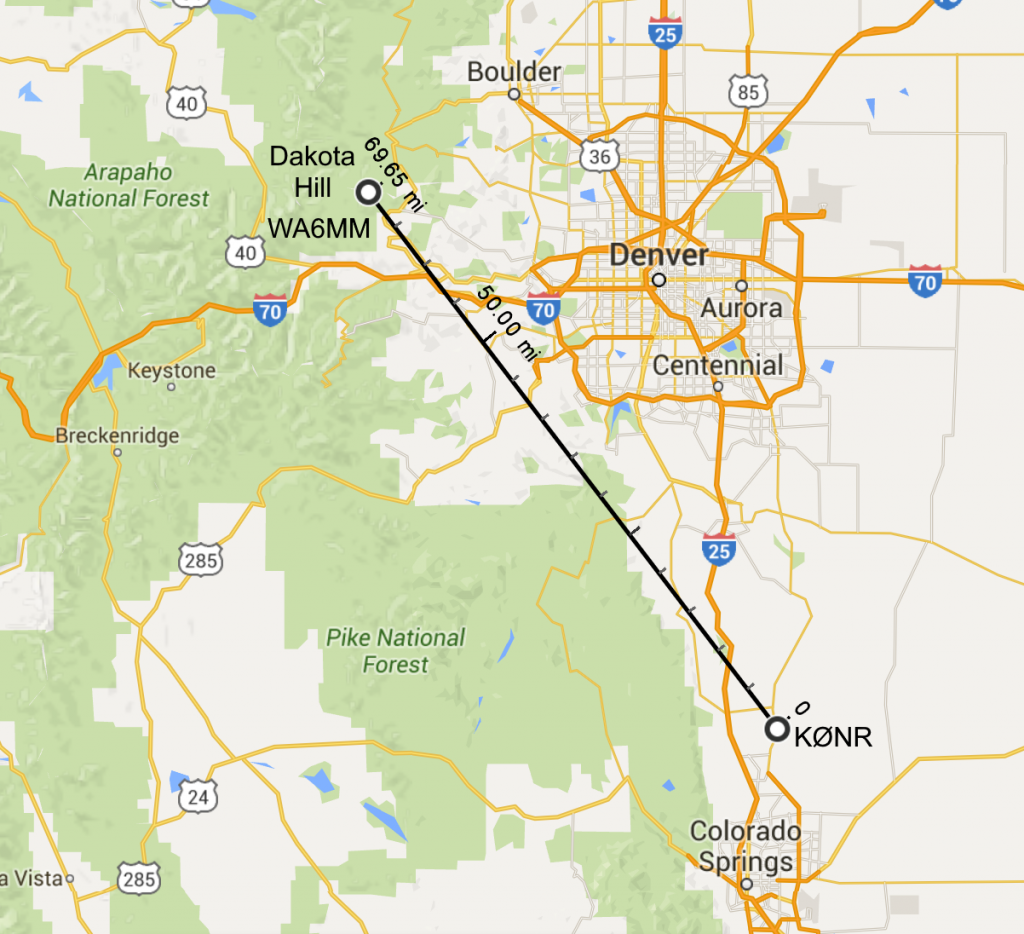 Heading south on Highway 83, the road was gaining elevation when Brad let me know he would soon be on the air. Dakota Hill is 10,929 feet and set back into the mountains, so I wasn’t sure if I could make the RF trip over Palmer Divide to work him. I pulled over at the crest of the hill and made a call. Brad had moved off 146.52 MHz due to some intermod interference and was on 146.55 MHz. Brad was using his trusty handheld radio running 5 watts into a half-wave antenna while I had a 50 watt mobile with a 1/4-wave antenna on the roof of the SUV. We made the contact without too much trouble…his signal was half scale on the meter. I listened to Brad work another station as I drove on, losing elevation and losing Brad’s signal on the other side of the hill. That was apparently THE SPOT to make the contact.
Heading south on Highway 83, the road was gaining elevation when Brad let me know he would soon be on the air. Dakota Hill is 10,929 feet and set back into the mountains, so I wasn’t sure if I could make the RF trip over Palmer Divide to work him. I pulled over at the crest of the hill and made a call. Brad had moved off 146.52 MHz due to some intermod interference and was on 146.55 MHz. Brad was using his trusty handheld radio running 5 watts into a half-wave antenna while I had a 50 watt mobile with a 1/4-wave antenna on the roof of the SUV. We made the contact without too much trouble…his signal was half scale on the meter. I listened to Brad work another station as I drove on, losing elevation and losing Brad’s signal on the other side of the hill. That was apparently THE SPOT to make the contact.
I put WA6MM into the log, scoring 6 SOTA chaser points for the 70 mile QSO. No, this wasn’t a rare DX station, no new record set, nothing that exceptional to report, actually. But it was a fun contact, with Brad hiking to a summit in December and me trying to find a location to work him.
This is why I like VHF on SOTA. Just another example of having fun messing around with radios.
73, Bob K0NR
The post Just Another VHF SOTA Contact appeared first on The KØNR Radio Site.
 POW Canteen Radio
POW Canteen Radio
Earlier this year, I was talking ham radio stuff with Brian Hutchison, AI6GH. Brian mentioned that his father was a Prisoner of War (POW) in World War II and built a radio while in a Japanese prison camp. I’ve read articles about vintage and spy radios from WWII, but I’ve never been that interested in the topic. When Brian told me about his father, I thought “Holy Grid Current! He built a radio as a POW? Now that’s interesting.” The more I learned about the story, the more I became fascinated by it.
Brian pointed me to some great resources that tell the story. I started with the March 2013 Newsletter of the Palo Alto Amateur Radio Association. Hiro Kato AH6CY has an interesting article describing two different clandestine radios, one of them built by Captain Russell J. Hutchison, Brian’s father. It was a one-tube shortwave receiver intended to keep the prisoners informed about the progress of the war. Mostly, they wanted to know when the invasion of Japan would occur. The radio was built into and disguised as an ordinary water canteen, obtaining its power from an electric light socket.
The book Prisoners of the Japanese: POWs of World War II in the Pacific by Gavan Daws provides some insight into Hutchison’s parts procurement:
At Davao the Japanese camp commandant put out a call for a prisoner who could fix radios. Hutchison got the job, plus a commission from the senior POW officer to build a secret shortwave set. The camp machine shop was a happy hunting ground for him. He fixed the commandant’s personal radio, an American Zenith. The other Japanese brought in their looted sets, Sears, Roebuck and Montgomery Ward brands, also a 35-millimeter Simplex movie projector with a sound amplifier that needed work. Every chance Hutchison got, he liberated parts. From a broken-down car radio he lifted a couple of tube sockets. He scrounged capacitors and condensers and resistors and a voltage meter, a headset that had survived a fire, everything up to four new tubes still in their packages.
My next stop was the website of Tim Sammons N6CC, who built a replica of the shortwave canteen receiver. This single-tube regenerative receiver has a regeneration control, a main tuning capacitor, bandspread tuning capacitor and an antenna tuning capacitor. See N6CC’s webpage for a schematic and other interesting technical details.
This book is available online: The Signal Corps: The Outcome by Thompson and Harris that provided further background (and the figure at the top of this article). Another valuable resource is First Into Nagasaki: The Censored Eyewitness Dispatches on Post-Atomic Japan and Its Prisoners of War.
This is a intrigung story of technological innovation under the most extreme circumstances. Most of us have never experienced such adversity that these POWs endured. Some of them managed to also built clandestine radios. A truly amazing story to consider as we enjoy the Thanksgiving holiday.
73, Bob K0NR
The post POW Canteen Radio appeared first on The KØNR Radio Site.
 Kids are Not the Future of Ham Radio
Kids are Not the Future of Ham Radio
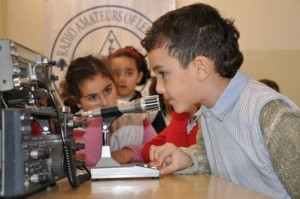 You’ve heard it a million times: our kids are the future. That statement gets applied to almost everything, including amateur radio. How can you argue with an obvious fact like that?
You’ve heard it a million times: our kids are the future. That statement gets applied to almost everything, including amateur radio. How can you argue with an obvious fact like that?
But I am starting to think it is incorrect.
We’ve had really good success on creating new hams of all ages in our Technician License Class (at the Tri-Lakes Monument Radio Association). We’ve been doing this for a while now and I think I am seeing a pattern emerge. We’ve been able to attract middle schoolers to the class and help them get their ham radio license. I’ve talked to many of them on the air. They’ve helped out with public service events. They seem to have fun playing with radios.
Then this thing called high school happens. The high school phase in the US is filled with tons of stuff to do: studying, homework, AP classes, science competitions, sports, dating, movies, driving and after school jobs. Way too much stuff. Ham radio starts to take a backseat to these normal high school activities. Then we don’t see the kids at the radio club meetings or chatting on the local repeater because they are busy doing other things. Have we lost them forever? Not sure.
High school is often followed by college which has its own set of challenges: a totally new environment, away from home, a new set of people, new studies, etc. There might be a ham radio club on campus but maybe not. If a kid is not off to college they are (hopefully) out doing something to establish themselves in this world. Eventually they emerge on the other side, get a job, get themselves established, sometimes with a spouse and maybe a kid or two. By this time they are 25 to 30 years old, depending on the individual.
I recently posted about the demographics of our students in the Tech License Class. The chart below shows the age distribution of our students from our most recent class. Hmmm, clearly most of our students are 30 or older. (Sorry, we have not collected age data with finer resolution.) This particular class is light on the under 18 crowd…sometimes we have a clump of kids in the mix.
 For whatever reason, it seems that most people find themselves in a situation as an adult that causes them to say “I want to get my ham radio license.” When asked why they want to get their ham license, the top response is always emergency/disaster communications, followed by backcountry communications, pursuing electronics as a hobby and learning about radio communications. I suspect that starting to be established in a community and having some disposable income also play a role.
For whatever reason, it seems that most people find themselves in a situation as an adult that causes them to say “I want to get my ham radio license.” When asked why they want to get their ham license, the top response is always emergency/disaster communications, followed by backcountry communications, pursuing electronics as a hobby and learning about radio communications. I suspect that starting to be established in a community and having some disposable income also play a role.
My hypothesis is that the most effective way of growing a vibrant ham radio community is to target adults ages 25 to 40.
This age range is more equipped and ready to be ham radio operators and are still young enough that they will be around for a while. Of course, we still want to work with all age groups, including kids and retirees. We’ve all seen very young hams get the bug for ham radio early and carry it throughout their life. And we also see plenty of older folks get interested in the hobby as they approach or enter retirement. We don’t want to miss out on either of those groups.
So that’s my read on the situation. I’ve got some data to support my theory but I can’t really prove it. What do you think? What are you seeing in your ham radio community?
73, Bob KØNR
The post Kids are Not the Future of Ham Radio appeared first on The KØNR Radio Site.
 Where Are The New Technicians Coming From?
Where Are The New Technicians Coming From?
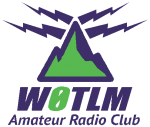 We just wrapped up our Technician license class sponsored by the Tri-Lakes Monument Radio Association. Thirty people took the Technician exam with 27 passing (90%). Four people went on to pass the General exam.
We just wrapped up our Technician license class sponsored by the Tri-Lakes Monument Radio Association. Thirty people took the Technician exam with 27 passing (90%). Four people went on to pass the General exam.
We offer the class twice per year and it always fills to capacity. Invariably, we wonder “where are these new hams coming from?” and instituted a survey to try to find out. Here’s the data from the most recent class, which is typical of previous classes.
Demographics
The class was almost all male (90%) and mostly above the age of 30. From time to time, we’ve had groups of Boy Scouts come through the class which shifts the age profile a bit lower.
 We ask about how they found out about the class. These responses overlap so we have them check all that apply. Most of these people find out about the class through normal “ham radio channels”, including the ARRL web site. A few people in the “other” category mentioned notices published in local weekly newspapers.
We ask about how they found out about the class. These responses overlap so we have them check all that apply. Most of these people find out about the class through normal “ham radio channels”, including the ARRL web site. A few people in the “other” category mentioned notices published in local weekly newspapers.
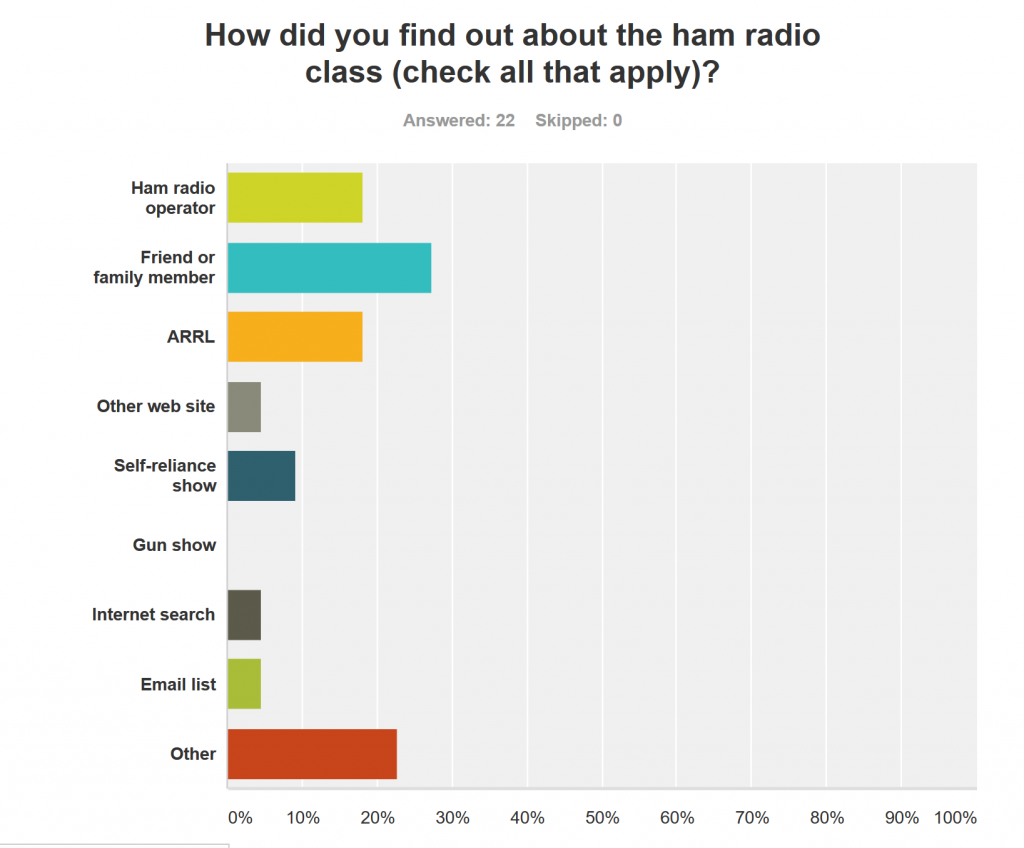 Here’s where it gets interesting. Why do they want to get their amateur radio license? Disaster and emergency communications continues to be the most common answer at almost 90%. This is followed by the closely-related Backcountry/Remote Communications (about 80%). About 60% of the respondents selected radio and electronics as a hobby. More than half said they want to learn about radio communications.
Here’s where it gets interesting. Why do they want to get their amateur radio license? Disaster and emergency communications continues to be the most common answer at almost 90%. This is followed by the closely-related Backcountry/Remote Communications (about 80%). About 60% of the respondents selected radio and electronics as a hobby. More than half said they want to learn about radio communications.
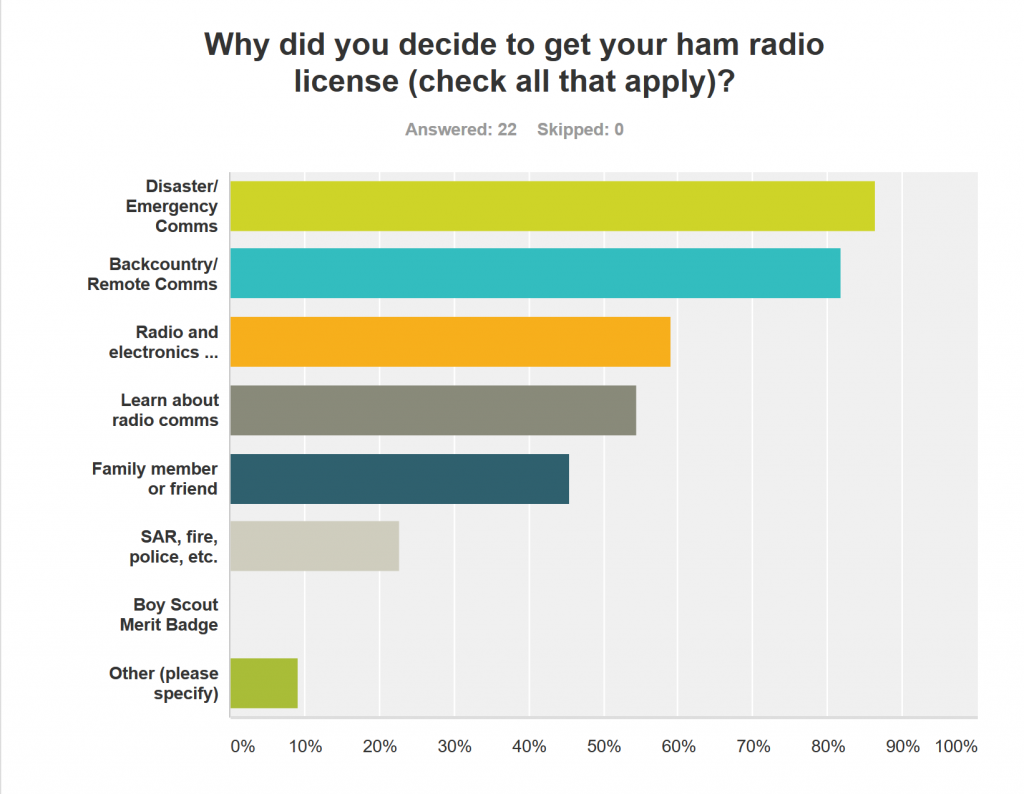 Not to be overlooked is the influence of family and friends at 45%. We often see family members of current radio hams that were
Not to be overlooked is the influence of family and friends at 45%. We often see family members of current radio hams that were badgered encouraged to get their radio license. We do see more than 20% that see a ham radio benefit to their involvement with fire, search and rescue, law enforcement and similar agencies.
Summary
Emergency and disaster preparedness rank high in the reasons why these people are interested in amateur radio. This may be fueled locally due to the recent devastating wildfires in Colorado. Many people experienced first hand what happens to the mobile phone and landline systems when disaster strikes. When All Else Fails. The other major motivation is the traditional hobby aspect of amateur radio. People like to learn about technology and have fun experimenting with it. Lately, this has taken the form of the Maker Movement.
73, Bob K0NR
The post Where Are The New Technicians Coming From? appeared first on The KØNR Radio Site.
